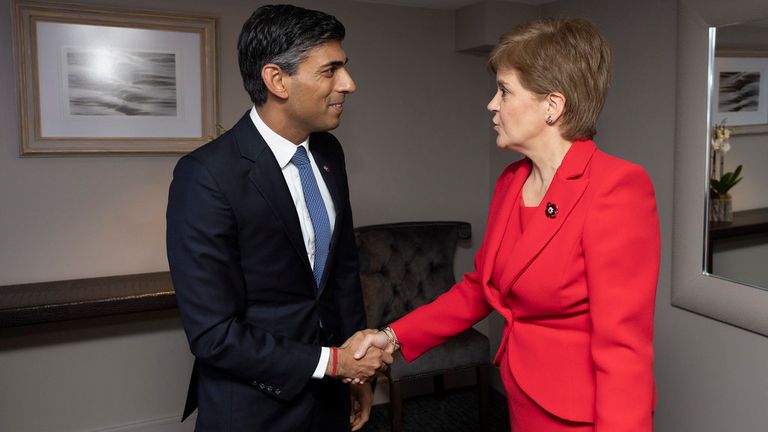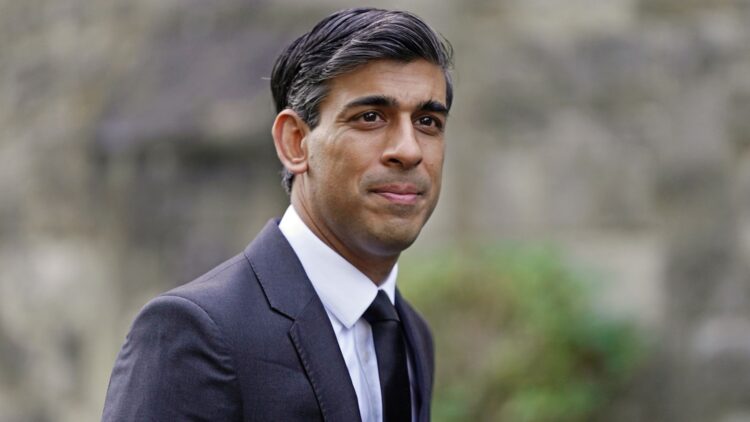By Tony O’Reilly-
British prime minister, Rishi Sunak has expressed concern about the potential impact of Scotland’s new gender reforms on other areas of the UK.
The prime minister said the government was taking advice on the implications of the reforms “as is completely standard practice”.
Scotland is the first country in the UK to approve a self-identification system for people who want to change gender, but the approval needs to receive the royal assent from Westminster to become law.
The reforms will make it easier for people to obtain a Gender Recognition Certificate (GRC). It removes the requirement for a medical diagnosis of gender dysphoria.
On Friday (13 January) the Prime Minister spoke to BBC Radio Scotland’s Good Morning Scotland. He described it as a “very sensitive area,” and refused to say if the government would block the bill.
“What I’m concerned about is the impact of the bill across the United Kingdom,” Sunak said. He added that “as is entirely standard,” the UK government would be looking at the bill.
“There may be impacts across the UK that we need to be aware of and understand the impact of them,” he continued. “And that’s what we’re doing, and once the government has received final advice it will set out next steps.”
On Thursday, Mr Sunak began a two-day visit to Scotland – his first since becoming prime minister – on Thursday evening, when he had private talks with First Minister Nicola Sturgeon at a hotel in Inverness.
The discussions were described as being “cordial”, with the gender reforms being discussed alongside the NHS, the economy and Scottish independence.
The two governments made a joint announcement on Friday about the location of two “green freeports” in Scotland, which will be at sites on the Cromarty Firth around Inverness and the Forth on the east of Scotland.
After meeting Scotland’s First Minister on Thursday, Mr Sunak said he wanted to work “constructively” with Nicola Sturgeon.

Rushi Sunak Meets Nicolai Strugeon Image: PA
Lowering Of Age
The controversial reforms, which are expected to come into force later this year, lower the age that people can apply for a gender recognition certificate (GRC) from 18 to 16.
They also remove the need for a medical diagnosis of gender dysphoria, with applicants only needing to have lived as their acquired gender for three months rather than two years – or six months if they are aged 16 or 17.
This has led to speculation that the UK government could use Section 35 of the Scotland Act to prevent the new law coming into force to protect concerns about the potential impact of enacting such gender reforms could have on the Equality Act and protect for only women spaces.
The provisions allow Scottish Secretary Alister Jack to prevent legislation passed by the Scottish Parliament from receiving Royal Assent if he believes it would have an adverse effect on issues that reserved to Westminster.
Jack has until the middle of next week, and would almost certainly face a legal challenge from the Scottish government if he did block the reforms.
Contested
The Scottish government has previously said that “any attempt by the UK government to undermine the democratic will of the Scottish Parliament will be vigorously contested”.
Controversy over the gender reforms saw a Scottish government minister resign in protest and several SNP MSPs vote against the proposals
The SNP’s leader at Westminster, Stephen Flynn, said the question of whether the UK government would provide Royal Assent went beyond the issue of gender recognition and people’s views on it.
He said: “This is about democracy. The Scottish parliament has voted in favour of legislation that sits within devolved competencies and it is incumbent upon Westminster to ensure that the legislation is passed in full”.
It’s true that the Scotland Act which set up the Scottish Parliament provides for that kind of scrutiny.
There have been occasions when UK ministers have successfully challenged in court Holyrood’s power to make laws in certain areas.
But never before have they intervened to stop a Scottish bill, passed by MSPs, from becoming law on the basis that it might have unwelcome impacts on UK legislation.
If that’s what the Scottish secretary, Alister Jack, decides to do with Holyrood’s gender recognition reform bill, a very big row and a court clash with the Scottish government is sure to follow.
Mr Jack is expected to consider some final advice over the next few days before making a decision.
Controversial
Gender reforms have long been a controversial with objectors just as strongly opposed to idea as supporters who deem the idea of major changes a positive step in the right direction.
Individuals who have undergone sex changes due to gender dysphoria want equal rights on a level playing field with those of the gender they have transitioned to without any opposition.
Critics of gender reform argue that new laws will spark further problems and confusion, and encourage more sufferers of gender dysphoria to undergo a sex change, which they say many can later grow to regret.
Opponents of the idea of gender reform believe people should be encouraged to feel comfortable with their natural gender and not seek to make life changing decisions to change their gender, putting them at risk of irreversible regret.
Advocates of gender reform believe transitioners should be allowed to be the gender they most feel comfortable with, and allowed all the benefits enjoyed by that gender without any red tape applied.




